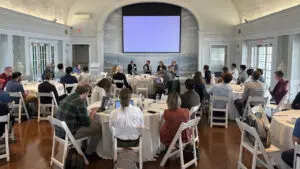From June 9–11, 2025, a gathering of prominent cancer researchers took place in Greenwich, Connecticut. The event focused on exchanging research findings, fostering collaboration, and strategizing advancements in the treatment of fibrolamellar carcinoma (FLC). This marked the sixth international summit of key FLC researchers hosted by the Fibrolamellar Cancer Foundation (FCF).
The summit’s opening keynote session, a panel discussion on Oncogene Targeted Immunotherapy in FLC, aimed to inform the broad fibrolamellar community of exciting progress achieved by immunizing patients against “DP,” the nearly universal driver of this cancer. DP is the aberrant protein kinase produced by the fusion gene found in FLC cancer cells (DNAJB1::PRKACA). Drs. Juliane Walz (University of Tübingen) and Mark Yarchoan* (Johns Hopkins University) related that multiple dramatic clinical responses have been observed in their independent clinical trials of similar vaccines targeting the unique junction between the “D” and “P” parts of the protein. Most patients in the trials mounted an immune response to a DP junction peptide (a fragment of the whole protein), and almost all of these showed clinical benefit, at minimum a significant period of stable disease. A subset of trial participants experienced extensive, durable tumor shrinkage, and currently show no evidence of disease (NED). One of these, Molly Hones, recounted her life experience as an FLC patient and a clinical trial participant eager to help advance research. Dr. Mark Furth, FCF’s Chief Science Officer, moderated the discussion. A recording of the discussion is available on FCF’s YouTube channel.
To promote the open exchange of unpublished data and ideas, the remainder of the conference was confined to active researchers and operated under a multi-party non-disclosure agreement. Drs. John Gordan* (University of California San Francisco) and Allison O’Neill* (Dana-Farber Cancer Institute) opened with a progress report on the development of Consensus Treatment Guidelines for FLC. A main goal is publication in a peer-reviewed journal of guidelines based on the experience of multiple clinicians who treat FLC at leading academic medical centers across the United States.
A session on Targeted Therapy offered deep dives into features of FLC cancer cells critical for their growth and survival. These define potentially exploitable vulnerabilities which may be addressed by drugs blocking specific cellular functions. Presenters were Drs. John Scott* (University of Washington), Yasemin Sancak (University of Washington), John Gordan, Taran Gujral (Fred Hutchinson Cancer Center), and Nabeel Bardeesy (Massachusetts General Hospital). A broad goal of these studies is to identify existing drugs already approved by the FDA or in clinical development for other cancers which, alone or in combination, might be repurposed to treat FLC. In a similar vein, Dr. Boris Pasche (Wayne State University) described a medical device that uses tuned radiofrequency electromagnetic fields to attack specific cancers. The device has received FDA approval for use in patients with conventional hepatocellular carcinoma and is being tested for potential activity against FLC.
A session on FLC Immunotherapy included detailed presentations on the peptide vaccines highlighted in the Keynote. Related talks focused on “adoptive cell therapy” using a patient’s own immune cells reprogrammed to make a specific T-cell receptor (TCR) derived from another FLC patient who responded exceptionally well to a vaccine. A third major topic was the potential to augment FLC therapy by overcoming immune-suppressive factors in the tumor environment. Session presenters were Drs. Walz, Yarchoan, Paul Thomas (St. Jude Children’s Research Hospital), Praveen Sethupathy (Cornell University), and Jason Carter (University of Washington).
The session FLC Oncogenesis and Model Systems session centered on how FLC cancers arise and on biological tools to support therapeutics discovery. Presenters were Drs. Sean Ronnekleiv-Kelly (University of Wisconsin–Madison), Anneliese Gest (University of California San Diego), Theo Hirsch (INSERM–Paris), Aleksander Skardal (Ohio State University), Benedetta Artegiani and Delilah Hendriks (both from Princess Máxima Center, Utrecht), and Wencheng Zhang (Tongji University, Shanghai). Key topics included the induction of FLC in mice, studies of FLC in three-dimensional “organoid” cultures, assay systems to identify useful drugs, and the genetics of other liver cancers with similarities to FLC.
A panel discussion on Clinical Trial Strategies featured Drs. William Harris (University of Washington), James Geller (Cincinnati Children’s Hospital), Juliane Walz (see clinicaltrials.gov identifiers NCT05937295 and NCT06789198), and Allison O’Neill (Dana-Farber). Active clinical trials of potential interest to FLC patients were presented by Drs. Marina Baretti (Johns Hopkins University; NCT04248569 and NCT06027086), Michael Ortiz (Memorial Sloan Kettering Cancer Center; NCT06620302), Kimberly Riehle (Seattle Children’s Hospital), Jessica Gartrell (St. Jude Children’s Research Hospital; NCT05468359), and Razelle Kurzrock* (Medical College of Wisconsin; NCT05674825).
The summit concluded with a discussion of resources that support the entire FLC research community. Patty Cogswell (FCF) spoke about tumor collection and uses of the FCF Biobank, housed at Massachusetts General Hospital. Presentations by Don Long (Cornell University) on multi-omics and Surya Saha (Velsera) on a new FLC Data Initiative byhighlighted how the availability of large data sets is enhancing research capabilities.
The 2025 Fibrolamellar Scientific Summit was a significant milestone in the growing collaboration among cancer researchers who are committed to sharing insights and developing new treatment approaches for this disease. FCF thanks all the world-class laboratory and clinic-based scientists who made the conference a great success!
* Member of FCF’s Medical and Scientific Advisory Board

